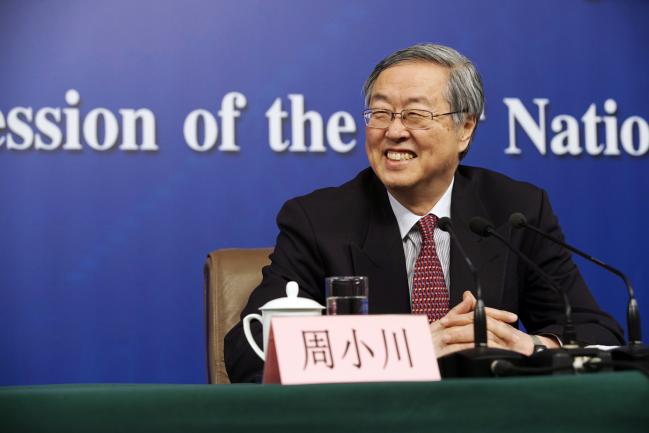(Bloomberg) -- After a record 15-year tenure in which he steered the nation through global crises, overhauled monetary policy tools and oversaw the elevation of the yuan to reserve-currency status, People’s Bank of China Governor Zhou Xiaochuan is riding into the sunset.
Zhou, 70, will hand the reins to his longtime deputy, Yi Gang, 60, leaving him to continue opening financial markets and capital borders and reducing risk after years of soaring debt.
The longest-serving central bank chief in the Group of 20 economies took office when Alan Greenspan was Federal Reserve chairman. The English-speaker explained global concerns to domestic leaders and forged ties around the world to further integrate China into the global financial architecture. He ended the yuan’s peg to the dollar and started liberalizing interest rates while boosting the economy to become the world’s second largest.
Zhou’s tenure spanned four Fed chiefs, three European Central Bank presidents, and premiers Zhu Rongji, Wen Jiabao and Li Keqiang. While lacking the independence of global peers, Zhou used his profile and elevated party rank to push for reform, most recently this month at the National People’s Congress where he said China “can be bolder in opening up.”
“I’ve spent so many years working in the financial system and many things have happened,” Zhou said with a touch of emotion at the packed briefing room on March 9. “It’s my honor to work with everyone to push ahead with financial reforms and opening up.”
As China’s industrial engines cooled, Zhou lowered the one-year lending rate in late 2014 and kept cutting to a record-low 4.35 percent in October 2015, where it remains. That benchmark has been overtaken by newer and more specialized instruments that manage liquidity through different channels, with the seven-day reverse-repurchase rate and the Medium-Term Lending Facility levels now helping to steer borrowing costs.
Zhou, a protege of Zhu, has pushed for a market-based interest-rate system since at least 1993, when he co-wrote a report that envisioned using rates as “indirect” economic tools. In 2013, he eliminated the lower limit on bank lending rates, letting banks set their own. And in 2015, the PBOC scrapped deposit caps, continuing a shift to a system where liquidity is determined by the price of capital.
Zhou steered the yuan into the International Monetary Fund’s reserve currency basket, which it formally joined Oct. 1, 2016, a major milestone in efforts to build a currency that reflects rising economic and political sway.
Global yuan use has picked up since China ended a U.S. dollar peg in 2005. In recent years, the currency’s role has been held back as policy makers reinforced capital controls to keep money from flowing out of the country. At the March 9 briefing, Zhou said yuan globalization will be gradual and can be stepped up when capital account restrictions have been lifted.
Zhou has contended with episodes of international criticism that China keeps the currency undervalued, including by U.S. President Donald Trump. Back in 2010, Zhou played tennis in Beijing with Lawrence Summers, then the chief economic adviser to President Barack Obama, and joked that the victor will decide the exchange-rate issue, according to a paper supervised by the official Xinhua News Agency. Zhou won.
China under Zhou became the world’s largest exporter, thanks in part to relatively low wages in the massive migrant labor pool. That advantage is waning though, and a shrinking working-age population is forcing a shift up the value chain.
Dominating exports helped build the world’s biggest foreign exchange reserves. Those helped after the 2015 yuan devaluation spurred capital outflows, allowing the PBOC to burn almost $1 trillion of the stockpile to defend the currency. Reserves have stabilized again.
The other side of Zhou’s legacy is debt. Years of financial repression where low lending rates were subsidized by poor returns for savers helped fuel the rampant growth in corporate debt that authorities are now seeking to contain. Zhou in October warned of a Minsky Moment, where asset values plunge following an era of unsustainable credit growth.
Chen Long, an economist at research firm Gavekal Dragonomics in Beijing, said Zhou’s gradualist approach to reform leaves behind three major challenges: completing interest and exchange rate reform, managing financial risk, and adapting to a bigger global role.
“Zhou has demonstrated that he can be relied on to maintain stability and accept political realities, making him a smart politician, not simply a technocrat,” Chen wrote in a recent note. “Zhou’s successor will very likely need to put financial stability over liberalization, and move carefully in defusing risks.”
